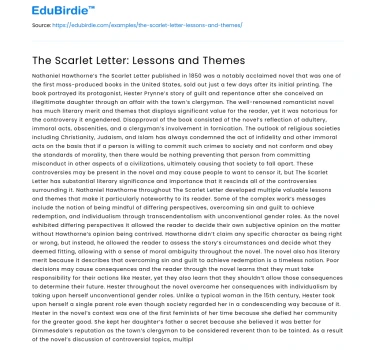Nathaniel Hawthorne’s The Scarlet Letter published in 1850 was a notably acclaimed novel that was one of the first mass-produced books in the United States, sold out just a few days after its initial printing. The book portrayed its protagonist, Hester Prynne’s story of guilt and repentance after she conceived an illegitimate daughter through an affair with the town’s clergyman. The well-renowned romanticist novel has much literary merit and themes that displays significant value for the reader, yet it was notorious for the controversy it engendered. Disapproval of the book consisted of the novel’s reflection of adultery, immoral acts, obscenities, and a clergyman’s involvement in fornication. The outlook of religious societies including Christianity, Judaism, and Islam has always condemned the act of infidelity and other immoral acts on the basis that if a person is willing to commit such crimes to society and not conform and obey the standards of morality, then there would be nothing preventing that person from committing misconduct in other aspects of a civilizations, ultimately causing that society to fall apart. These controversies may be present in the novel and may cause people to want to censor it, but The Scarlet Letter has substantial literary significance and importance that it rescinds all of the controversies surrounding it.
Nathaniel Hawthorne throughout The Scarlet Letter developed multiple valuable lessons and themes that make it particularly noteworthy to its reader. Some of the complex work’s messages include the notion of being mindful of differing perspectives, overcoming sin and guilt to achieve redemption, and individualism through transcendentalism with unconventional gender roles. As the novel exhibited differing perspectives it allowed the reader to decide their own subjective opinion on the matter without Hawthorne’s opinion being contrived. Hawthorne didn’t claim any specific character as being right or wrong, but instead, he allowed the reader to assess the story’s circumstances and decide what they deemed fitting, allowing with a sense of moral ambiguity throughout the novel. The novel also has literary merit because it describes that overcoming sin and guilt to achieve redemption is a timeless notion. Poor decisions may cause consequences and the reader through the novel learns that they must take responsibility for their actions like Hester, yet they also learn that they shouldn’t allow those consequences to determine their future. Hester throughout the novel overcame her consequences with individualism by taking upon herself unconventional gender roles. Unlike a typical woman in the 15th century, Hester took upon herself a single parent role even though society regarded her in a condescending way because of it. Hester in the novel’s context was one of the first feminists of her time because she defied her community for the greater good. She kept her daughter’s father a secret because she believed it was better for Dimmesdale’s reputation as the town’s clergyman to be considered reverent than to be tainted.
Save your time!
We can take care of your essay
- Proper editing and formatting
- Free revision, title page, and bibliography
- Flexible prices and money-back guarantee
As a result of the novel’s discussion of controversial topics, multiple groups including religious institutions, parents, and schools have decided to censor the acclaimed novel. Their argument mostly claimed that they viewed the work as a dirty story with bad morals and “pornographic and obscene” scenes because the work dealt with infidelity, a clergyman’s involvement in fornication, and an illegitimate child born out of wedlock. Some religious officials even condemned the book as a work belonging to a “Brothel Library.” These bans were made since the initial publishing of the book up until more recent contemporary times. Communities have banned the book and the movie because it confronts and describes immoral acts that society didn’t want to regard since it can stir a possible desire in its audience to do so, making a moral society fall apart. However, this notion is misinformed because attempting to ban novels creates a mystical fascination and a natural inclination to do what is forbidden and retain knowledge. Similar to the Adam and Eve tale where God in the Bible told them not to eat from the forbidden tree of knowledge, yet they defied God by doing exactly what he explicitly forbad. Human nature is to learn what shouldn’t be taught and to do what shouldn’t be done, and prohibiting people from reading The Scarlet Letter will only encourage them to read it instead.
Conclusion
The Scarlet Letter should continue to be read and taught in high schools since it has significant literary merit allowing students to use their analytical thinking skills by asking questions, discussing controversies, and making judgments. The novel’s literary merit included themes of achieving sin, guilt, and redemption, responsibility, and achieving individualism through unconventional gender roles. This novel overall creates a sense of critical reading and thinking within the students reading it. It should be specifically taught in high schools since it discusses more mature themes and situations that may not be suitable for younger audiences because they may not understand the immoral acts or because they may not appreciate the lessons of the story.
Many controversies may surround The Scarlet Letter because of its mature themes and lessons presented in the novel. This may ultimately cause people to want to censor it, but The Scarlet Letter has substantial literary significance and importance that teaches society many lessons. This literary work supersedes the controversies surrounding it and should be taught in high schools because it can help students grasp the issue and learn from it.






 Stuck on your essay?
Stuck on your essay?

